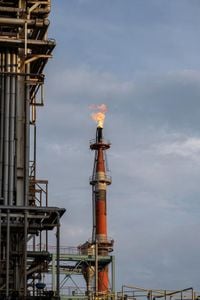The Mexican government is set to lift restrictions on shale gas production as part of a strategic move to reduce its heavy reliance on the United States for natural gas. Currently, approximately 72% of the natural gas consumed in Mexico is imported from the U.S., primarily through pipelines. This dependence has raised concerns among Mexican officials, especially in light of the unpredictable trade policies of U.S. President Donald Trump, which could lead to supply shortages or increased import costs.
Mexico ranks sixth in the world for shale gas reserves, and the government believes that developing these resources could enhance its energy independence. Previously, strict regulations were imposed on shale gas extraction due to environmental concerns, particularly regarding hydraulic fracturing, or fracking, a method criticized for its potential ecological damage. Despite having supported these restrictions, President Claudia Sheinbaum is reportedly reconsidering her stance.
The administration is now analyzing options for quickly removing these restrictions and ramping up shale gas production. According to sources, the government has initiated discussions with private companies to boost fracking operations. Although the process to lift these restrictions could take several months, businesses are prepared to invest in shale projects, with new ventures likely to be funded through public-private partnerships.
In addition to increasing shale gas production, Mexico is also contemplating expanding its strategic gas reserves. Following Sheinbaum's election victory in the summer of 2024, her energy team has engaged with both domestic and international companies to revive a plan initiated by her predecessor, Andrés Manuel López Obrador, aimed at enhancing natural gas storage capacities for emergencies. This initiative is particularly pressing as Mexico has seen its natural gas imports surge from 1,258 million cubic feet per day in 2009 to 6,178.6 million cubic feet per day in 2023, coinciding with a decline in domestic production.
In 2018, the Mexican Ministry of Energy mandated that Cenagas, the agency responsible for managing the country’s natural gas transportation and storage, establish a strategic reserve of 45 trillion cubic feet of gas by 2026—enough to sustain the nation for five days. However, the previous administration failed to attract contractors for the necessary services to convert four depleted fields into gas storage facilities. Reports indicate that capital expenditures for doubling the natural gas storage capacity could range from $420 million to $2.58 billion, depending on the chosen technology.
The backdrop to these developments includes recent tariffs imposed by the United States. On March 4, 2025, the U.S. introduced a 25% tariff on imports from Mexico and Canada. In response, Sheinbaum indicated that Mexico would implement similar measures against U.S. goods. Notably, the enforcement of these tariffs on goods covered by the trilateral trade agreement was postponed. Furthermore, on March 26, Trump announced a 25% tariff on all vehicles produced outside the U.S., with Mexico being the largest exporter of cars to the U.S. Fortunately for Mexico and Canada, they were not included in the list of countries facing new universal tariffs.
On April 2, Trump signed a decree imposing tariffs ranging from 10% to 50% on goods from 185 jurisdictions. Additionally, a minimum customs tariff of 10% for all countries took effect on April 5, 2025. These trade tensions have heightened the urgency for Mexico to secure its energy supply and reduce dependence on U.S. imports.
As the Mexican government navigates these complexities, the potential lifting of shale gas restrictions represents a significant shift in policy, one that could affect both domestic energy dynamics and international trade relations. While the move may bolster Mexico's energy independence, it also poses risks to Sheinbaum's political image as a progressive leader committed to environmental protection.
In summary, the Mexican government's plan to increase shale gas production and expand its strategic reserves comes amid a backdrop of aggressive U.S. trade policies and a pressing need for energy security. The coming months will be crucial in determining how these initiatives unfold and what impact they will have on Mexico's energy landscape and its relationship with the United States.


